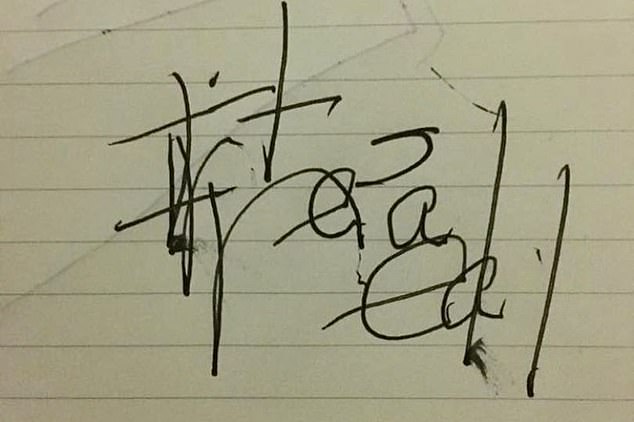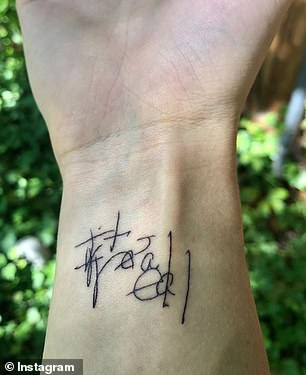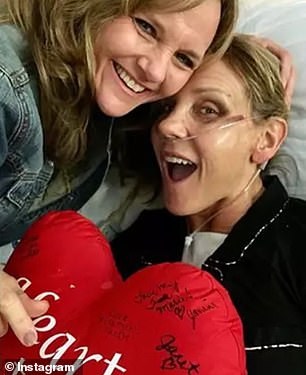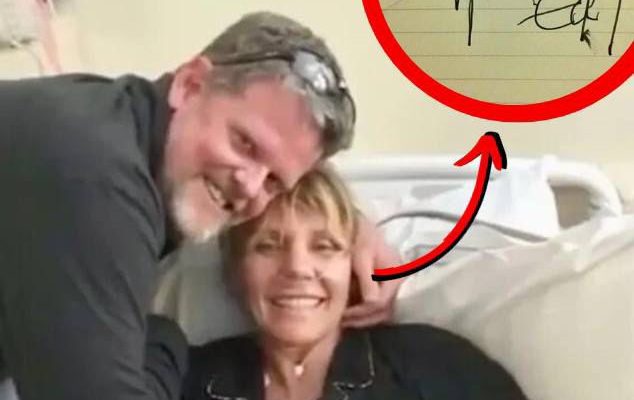After narrowly escaping death, Tina Hines awoke and scribbled a terrifying note for her loved ones.
Last February, Tina and her husband Brian were looking forward to a trek close to their home in Phoenix, Arizona.
Tina had always been healthy, but just as they were about to set out, she passed out.
According to Brian, he knelt down next to his wife, who had gone a dark purple, and began performing CPR on her.
The mother-of-four was briefly brought back to life, but Brian had to do it again before paramedics could take over.
Tina was resuscitated a total of six times before she awoke at the hospital, and the team kept losing her during the terrifying ambulance ride and during treatment.
Tina and her family told AZfamily.com that she was essentially dead for a total of 27 minutes.
She was intubated and unable to talk while at the hospital, but as soon as Tina woke up, she motioned for a pen so she could scribble her mysterious message, which she claims relates to heaven.
Tina Hines wrote “it’s real” in practically unintelligible lettering, referring to the glimpse of heaven she claimed to have had during the 27 minutes she spent “dead” after suffering a severe cardiac arrest.

Tina told AZfamily.com, “It was so real, the colors were so vibrant.”
She recalled seeing a person standing in front of dark gates with a bright yellow light burning behind them, which she believes to be Jesus.

Tina merely ‘nodded’ upward when her loved ones inquired about what was genuine while she was still being intubated.
Tina is grateful to be alive and able to share her inspiring tale.
Outside of a hospital setting, almost 90% of patients who experience abrupt cardiac arrest pass away.
However, Tina’s husband’s CPR probably meant the difference between life and death.

When CPR is given by a bystander, survival rates for cardiac arrest increase considerably, from 10% to over 45% (although women are 27% less likely to receive CPR from someone other than a paramedic).
The fact that cardiac arrest occurs absolutely unexpectedly is one of the reasons it can be so fatal.
Even Tina, who has never had any cardiac difficulties or other health issues, could encounter an unforeseen electrical malfunction that would stop her heart in its tracks.
Over 356,000 US individuals are affected by this horrible health issue each year.

According to numerous research on so-called “NDEs,” the majority of people have no recall of the brief periods of time they were technically dead, but a stunning 10 to 20 percent had visual or sensory “near death experiences.”
Scientists are getting closer to deciphering what occurs in the brain when the heart stops, as mystical as they may seem to those who have had NDEs.
Blood flow to the brain eventually quits after the heart stops beating.
However, a small 2013 University of Michigan study on rats found that something odd seemed to occur right after a sudden cardiac arrest.
Nine rats were put into cardiac arrest by the researchers, and they saw a spike in brain activity just before each animal died.
They describe “a widespread, transient surge of highly synchronized brain activity that had features associated with a highly aroused brain” as occurring in a dying brain, not just any activity.
To put it another way, the brain acts as though it is still very much alive during the initial few seconds after the body has passed away. It may even appear to be “hyperactive.”
They hypothesize that persons who experience near-death visions, particularly those that are consistent with what they believe they will see after their lives have ended, may do so as a result of this surge of unexpectedly ordered, most likely conscious brain activity.
But definitive scientific proof of that notion is still a long way off.
The lettering may have been difficult for Tina and her family to understand, but they think the message was clear: paradise is a real place.




